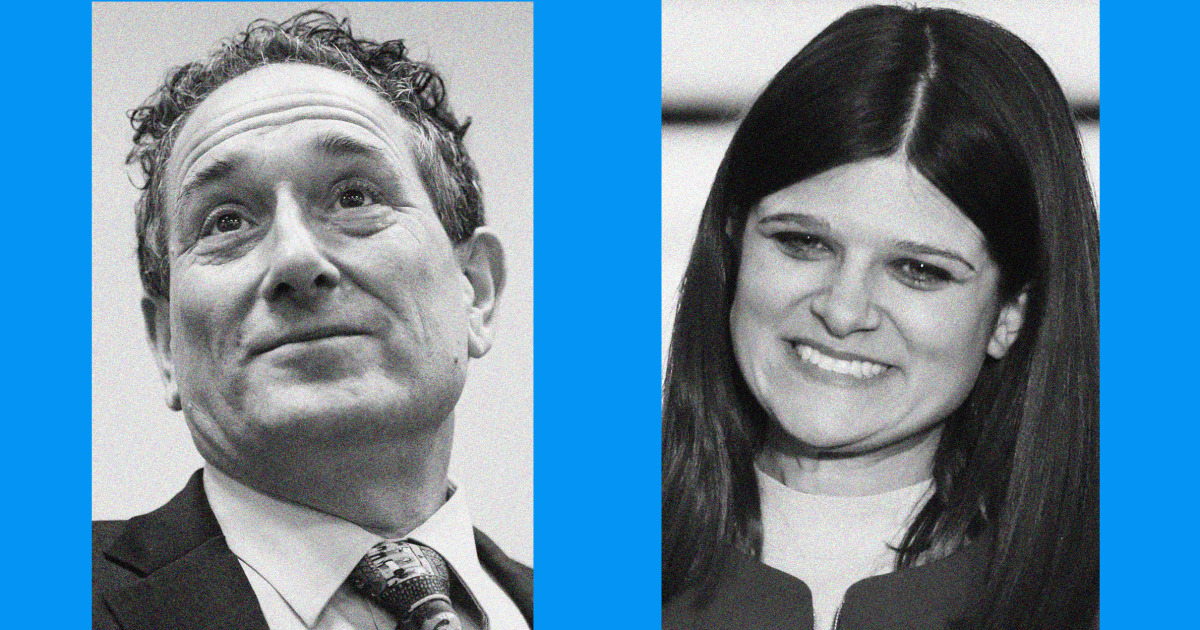
WASHINGTON — There’s a lot at stake in a rare incumbent-vs.-incumbent Michigan Democratic congressional primary Tuesday: the ideological direction of the Democratic Party, U.S. policy toward Israel and millions upon millions of dollars.
Rep. Haley Stevens, D-Mich., more centrist and better funded, is trying to take down Rep. Andy Levin, D-Mich., the progressive scion of one of the state’s most prominent political families.
A recent independent survey found Stevens up by 27 percentage points.
“That’s pretty consistent with what we’ve been seeing,” said Larkin Parker, a spokeswoman for Stevens, who added that Stevens’ team is “expecting this to be an early call.”
But Levin’s camp insists the public survey does not match up with its own polling or reflect voter sentiment.
“Our internals are still showing a really close race,” spokeswoman Jenny Byer said.
Either way, the race has drawn national and international attention as a proxy war between factions of the pro-Israel community, with the hawkish American Israel Public Affairs Committee, or AIPAC, backing Stevens and the dovish group J Street supporting Levin. At the local level, both campaigns have focused on wooing voters of color, who make up 29% of the district’s voting-age population.
More broadly, the fight pits the ideological wings of the party and carries implications for which side suburban Democrats favor heading into November’s general election and the 2024 presidential race.
On back-to-back weekends in late July, two liberal lions, Sens. Bernie Sanders, I-Vt., and Elizabeth Warren, D-Mass., trekked to Pontiac — 30 miles northwest of Detroit — to defend Levin. In addition to AIPAC, which helped gather donations and used its political action committee to buy more than $900,000 in ads in the district, Stevens claims the support of EMILY’s List — a group that supports abortion rights — and former Secretary of State Hillary Clinton.
Stevens and Levin are facing each other because Michigan’s congressional map was redrawn to combine significant parts of their existing turf into the same district, along with a chunk of territory currently represented by Rep. Brenda Lawrence, D-Mich. Lawrence decided to retire, and she has endorsed Stevens, as has Rep. Joyce Beatty, D-Ohio, the chair of the Congressional Black Caucus.
The two lawmakers almost always vote the same way on the House floor. But Levin is an activist who has embraced the main pillars of the progressive movement’s agenda, including Sanders’ Medicare for All single-payer health insurance plan, the Green New Deal climate proposal and criticism of Israel’s handling of its relationship with the Palestinians.
One of Stevens’ most influential supporters this year accused Levin, who is Jewish, of being “arguably the most corrosive member of Congress to the U.S.-Israel relationship.”
Stevens, who prefers a public option for health insurance, has not signed on to the House’s Green New Deal bill, and she has consistently supported America’s backing of Israel’s government. Allies routinely describe her as pragmatic in her approach to politics.
In one of their few splits over major legislation, Stevens voted for the United States-Mexico-Canada trade deal, which revised and replaced the old North American Free Trade Agreement among the U.S., Mexico and Canada. Levin, who has backing from some national unions, voted against the Trump-era agreement.
While the race directly affects just one seat in Congress, the spending and high-profile endorsements both point to the importance political elites place on the outcome of the contest, which has come to represent much more to activists, donors and the leaders of the progressive and centrist wings of the Democratic Party.
Larkin said Stevens got a “big jump” in her numbers after the Supreme Court’s Dobbs decision, which overturned Roe v. Wade’s federal protection for abortion rights.
Stevens’ support in the business community and among AIPAC-affiliated donors had helped her raise $4.7 million by mid-July, $1.5 million of which she still had on hand for the final few weeks of the race.
Levin, whose father and uncle served in Congress, has had trouble keeping pace. He had raised $2.7 million by mid-July and had a little more than $700,000 on hand.
Outside groups have poured money into the race, disproportionately in favor of Stevens.
In addition to the $900,000-plus that AIPAC’s political committee spent on ads for her, EMILY’s List shelled out more than $875,000 for ads backing her. Levin’s outside supporters have spent a little more than $200,000 to promote his chances, according to Federal Election Commission records.
Source: | This article originally belongs to Nbcnews.com










